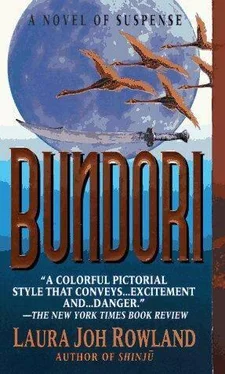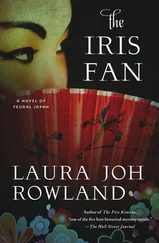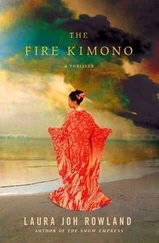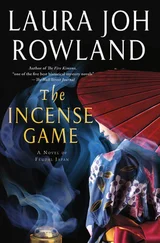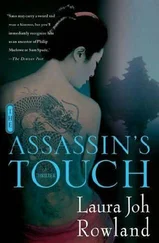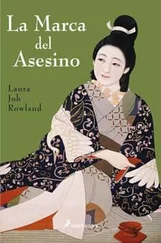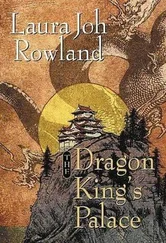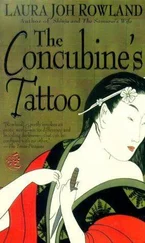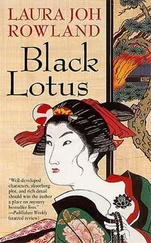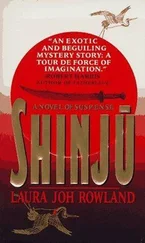“Oh, no, oh no,” he wailed. “Then it was a ghost I saw last night. I’m cursed. I’m going to die!” His ashen pallor returned; he swayed.
“The killer is a living human, not a ghost.” Sano spoke forcefully, throwing the pharmacist and his wife a warning glance. “Here, Udoguchi- san , put your head on your knees.” He positioned the sentry, waited until the man’s gasps ceased and his trembling abated. “Now. Describe the person you saw, and tell me when you saw him.”
Sitting upright, the sentry shook his head until his loose jowls wobbled. “He was the last person to pass my gate before closing. I spoke to him, but he didn’t answer. And it was so dark and foggy that I didn’t get a good look at him.”
“Was he fat or thin?” Sano asked patiently. “Tall or short?”
“I don’t know, I don’t remember. He was samurai-at least I think he had swords. He was wearing a baggy cloak. And a big straw hat, so I couldn’t see his face.”
Sano’s hopes dwindled. Even if the man was the killer, no one could possibly identify him from Udoguchi’s description. “Was he carrying anything?“ he asked, hoping at least to learn whether the man might have had Kaibara’s head with him, thereby helping to establish the time of the murder.
“I don’t remember.”
“Did you notice anything else about him? Think hard.”
But the sentry could recall nothing else about the man he’d seen. Sano reviewed the results of the interviews with frustration. That the murderer was a samurai might be inferred from the manner of killing, but it was dangerous to make assumptions. To have such a poor description of the suspect was discouraging, and. the witnesses’ stories didn’t establish the crime’s exact time frame or narrow the field of suspects.
The old pharmacist had found the body before dawn, before the gates opened. This meant that Kaibara had died last night, when he and the killer had entered the street before the gates closed. But Udoguchi had found the head on his way home after the gates had reopened. The killer could have placed the bundori on the firewatch tower either last night, or very early this morning. Sano had hoped to discover that the killer had murdered Kaibara, taken the head home, prepared the trophy, and put it in the tower during the relatively short time between nightfall and the closing of the gates-a feat that required he reside in the pharmacists’ district. But with the whole night at his disposal, he could have come from anywhere.
“Thank you for your hospitality and your help,” Sano said to the old couple. “I must order you not to spread your ghost story; you’ll only frighten people.” To the sentry, he said, “I’d like to see the tower where you found the head.”
Seeing Udoguchi’s mouth drop in horror, he added hastily, “You don’t have to go back there. Just show me.”
“Yes, master.” Obviously relieved, Udoguchi accompanied Sano out to the street, where he raised his hand and pointed.
Sano saw the tower rising above the rooftops several streets to the east. As he started toward it, a large procession of curious onlookers followed. All had apparently learned his identity and wanted to watch him work.
“Go!” Beside him, Hirata raised his jitte . “Give the sōsakan-sama room!”
He and his assistants, though unable to scatter such a large crowd, held it at bay, letting Sano continue to the tower unhampered. Sano realized that he might actually get better-and certainly more willing-service from the young doshin than from Tsuda and Hayashi.
He mounted the ladder’s rungs. They felt damp, so he was disappointed but not surprised when he reached the square wooden platform and found the boards clean, with a small puddle in the center. A gritty substance crunched under his feet: salt. The townspeople had already washed and purified the tower to remove the spiritual pollution conferred by its contact with death, eliminating all traces of the trophy and the murderer.
Sano braced himself against the poles that supported the tower’s roof and gazed out over the houses. In a city made of wood, where the citizens used charcoal braziers for heating and cooking, fire posed an everpresent threat. Hardly a month passed without one, and thirty-eight years ago the Great Fire of Meireki had destroyed most of Edo and taken a hundred thousand lives. The residents kept watch from these towers, ready to ring the bells suspended from their roofs at the first sight of smoke or flame. Today the air was clear in all directions. But last night the fog had made firewatching useless. The killer had chosen his time well, and escaped the scene without leaving a clue. Shaking his head, Sano looked down in dismay.
The teeming streets reminded him that Edo boasted a population of one million, including some fifty thousand samurai. He’d investigated only one other murder, completely unlike this one. How would he ever find the killer? With the possibility of failure and disgrace looming large before him, Sano almost wished he’d heeded Noguchi’s advice. Yet Bushido demanded from a samurai unstinting, uncomplaining service to his lord. And his promise to his father demanded fulfillment. Now, more than ever, Sano longed for his father’s wisdom and guidance.
“ Otōsan , what am I going to do?” he whispered.
If his father’s spirit heard, it didn’t answer. Feeling his bereavement all the more, Sano descended the ladder to find Hirata waiting for him.
“Question everyone in the district and find out if they noticed anything or anyone suspicious last night or this morning,” he said. “Watch for men with sword wounds. Conduct a door-to-door search of every building, starting at the firetower and the pharmacy and working outward.”
He explained what to look for, then paused, reluctant to trust this young stranger. But he had an important matter to attend to.
“Report to me outside the main gate of the castle at the hour of the dog,” he finished, and took his leave.
“ Sōsakan-sama .”
Sano, already some ten paces down the street, turned to see Hirata still standing by the ladder. “Yes?”
“ Sumimasen -I’m sorry; excuse me.” Hirata’s Adam’s apple jerked in a nervous swallow, but his voice was steady as he said, “You won’t regret letting me work for you.” A brave red spot burned in each cheek.
Sano regarded him in surprise. The young doshin ’s manner combined the purposefulness of maturity with youth’s brashness. Here was another samurai who saw this investigation as an opportunity to prove himself. Sano felt an unexpected burst of sympathy for Hirata.
“We’ll see,” he said more kindly. He, of all people, knew that determination could compensate for inexperience.
Flushing brighter, Hirata hurried away, his step jaunty.
Sano retrieved his horse and headed north toward Edo Morgue. Perhaps Kaibara Tōju’s remains would yield the clues that the murder scene had not.
High above Edo Castle, the keep’s gloomy top story echoed with the footsteps of guards patrolling the corridors and stairways below. Afternoon sunlight filtered through the barred windows to hang in thin, dusty shafts in the air. Chamberlain Yanagisawa stood facing a window, his tall, elegant form silhouetted against the alternating bands of light and dark.
“So, kunoichi ,” he said. A sneer curled the edges of his voice. “What information have you and your spy network managed to collect regarding Sōsakan Sano?”
Aoi, standing behind him, flinched at the way he’d addressed her. Kunoichi : female ninja; practitioner of the dark martial arts, descended, as legend claimed, from demons with supernatural powers. She didn’t object to the term; she was proud of what she was. But Yanagisawa’s open contempt started a slow, angry fire in her blood. Deeper than that of a man for a woman, superior for inferior, it echoed that in which the samurai had held the ninja since time immemorial. They despised her people as dirty mercenaries who used stealth, sabotage, covert assassination, espionage, and deception instead of the forthright samurai martial arts. Aoi wondered whether Chamberlain Yanagisawa realized that his class had created the demons themselves. Once peace-loving Buddhist mystics, the ninja had developed their famed, deadly skills as a defense against the ruling samurai who burned the temples and killed the worshippers in an attempt to destroy what they didn’t understand. However, this aversion had never stopped Yanagisawa and his kind from employing the ninja to do work that they themselves considered dishonorable, cowardly, and beneath them.
Читать дальше
